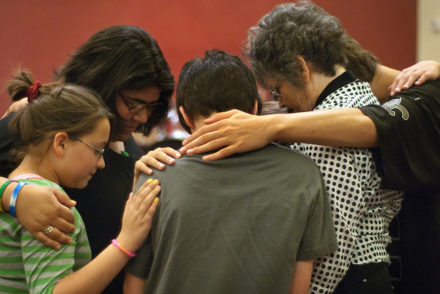We live in a connected age. The internet makes the world a much smaller place. News travels immediately, and status updates are shared instantly to anyone in the world. The marvel of these technological achievements would astonish someone just fifty years ago. One would expect such powerful technology to bring people together. Yet, the hyper-connectivity of our technological age has only brought isolation and has solidified the influence of individualism in western culture. All of this presents a unique challenge to the church, particularly the Baptist church.
Baptists believe that the church is a community of the regenerate, made up of members who have confessed Jesus as Lord and live life together in light of that confession. The church exists as a community of the saints, a local manifestation of the church universal, living together on mission for their city. The church is inherently communal. Paul describes how the Gospel takes “strangers and aliens” and joins us together as “fellow citizens with saints and members of the household of God” (Eph 2:19). In Christ, we are being joined together and being built up into a temple of the Lord. Individualism, then, swings a wrecking ball to this Holy Spirit directed construction, and sadly many church’s have only accelerated the destruction.
As churches pander to a consumeristic culture and market the Gospel to customers, we only foster the idolatrous individualism of the culture. The church-as-product has created a generation of church hoppers, an assortment of disconnected worshipers who happen to be watching the same show on a Sunday morning. Many Baptist churches (who should champion the church as community due to their ecclesiology) have succumbed to the individualistic demands of the culture, and have thus compromised their historic identity. The evidence of this compromise is found throughout Baptist churches—meaningless membership, lack of church discipline, and confusion about baptism being just a few examples.
How did we arrive to where we are today? I believe this individualistic shift in baptist churches occurred through two primary catalysts.[1]
Shift 1: E. Y. Mullins and Soul Competency
The first contribution to the rise of individualism in Baptist churches was by E. Y. Mullins (1860–1928) and his doctrine of soul competency. Mullins served as president of the Southern Baptist Theological Seminary for twenty more years. Mullins promoted an idea called personalism. He defines personalism as taking “the individual and personal life of man as its starting point.” (“Pragmatism, Humanism, and Personalism: The New Philosophic Movement,” Review and Expostier 5 (October 1908): 510.) Mullins planted the seed of individualism through his doctrine of soul competency that has since produced the bitter fruit we see today. Mullins’ teaching combined an experiential flair with soul competency which produced the isolated, disconnected, and individualistic contours of modern Baptist churches. In comparing Mullins with The Princeton Seminary professor J. Gresham Machen, historian Sean Michael Lucas wrote, “For over seventy years, Southern Baptists have harvested the shallow discipleship and vapid theology that resulted from sowing Mullins’s theological seeds of experience.”[2]
Shift 2: Distorting the Priesthood of All Believers
The second contribution has been a subtle twisting of the reformation doctrine the priesthood of all believers. Instead of the priesthood of ALL believers, it has been transformed into the priesthood of THE believer. When Luther first began to promote the priesthood of all believers, it was oriented towards the church corporately, not to the private life of the individual. As Carylye Marney puts it, “We are priests to each other. I do not priest me. I priest you and vice versa. On this the community of witness takes its rise. Without it no church exists at all.”[3] Luther never intended to argue that the believer doesn’t need the church, rather just the opposite. The members of the church need each other! Therefore, the church is not an isolated, disconnected group of christians who priest themselves, rather the church is an interconnected and invested community that priest one another.
Treating the Infection of Individualism in the Church
There are other contributing factors to how individualism’s influence has grown in the church, including revivalism, democratic principles, and even free-market capitalism. So how should the church treat this infection called individualism? Let me suggest a few ways.
First, we must recover meaningful church membership. Pastors need to blow off the dust of their church covenant and begin using it to teach on the covenant bond of membership in the local church. The church covenant is the written document of your church that outlines what it means to live in community in a local church. It clarifies the expectations of every member and helps them to understand their accountability to the church and their responsibility for the church. We must raise the level of expectations for membership instructing our congregation to live holy lives and committing themselves to the building up of the body of Christ. Teaching through the church covenant or starting a new membership class can be a great way to begin recovering meaningful membership within your congregation.
Second, we must de-individualize believer’s baptism. Strangely enough, Baptist churches don’t teach much about baptism. As a result, many see baptism as an exclusively individual act. Believer’s baptism must be understood as the door of entry into the life of the local church. We are baptized not only into Christ, but also his body, the local church.
Third, we must reject Baptist clericalism. Another bizarre symptom of individualism in Baptist churches is a sort of clericalism, where only paid pastor’s can do the work of ministry. This mindset sees the pastor as chaplin, care-giver, and ministry-services provider. Instead of seeing ever member as a doer of ministry, ministry is outsourced to paid professionals. Baptist churches must reject clericalism and cultivate a communal ministry to one another and the world.
Fourth, we must create a culture of communal discipleship. Pastor’s and ministry leaders must eliminate the category of “pew sitting” in the congregation. Pastors must understand themselves not as the exclusive “doers” of ministry, but as the “equipers” of ministry (See Eph 4:11–15). Pastors must mobilize their congregation to evangelism and discipleship, challenging them to step outside of their individualistic prison into the freedom of selflessness, service, and ministry to others.
The Compelling Vision of a Contrasting Community
Instead of replicating the culture, the church must provide a life-giving alternative. As the hyper-connectedness of our technological age breeds isolation, people are starving for community. Here, then, is the church’s great opportunity. The church, as a city set on a hill, must contrast the culture by modeling a self-denying community of love. The church is to attract the lost, but not through the imitation of American consumerism, but with the contrasting community of the redeemed. The Gospel brings us out of our own narcissism into union with Christ, but also union with one another in the church. The greatest evangelistic strategy the church can employ today is this: demonstrate a compelling and contrasting community that can only be explained by the Lord Jesus Christ.
NOTES
[1] By no means are these the only two historical factors. Due to the limited scope of a blog post, I’ve only selected two. For a fuller treatment see chapter 8, The Priesthood of All Believers, in Paul Basden, ed., Has Our Theology Changed?: Southern Baptist Thought since 1845 (Nashville, Tenn: B&H, 1994).
[2] Sean Michael Lucas, “Christianity at the Crossroads: E. Y. Mullins, J. Gresham Machen, and the challenge of Modernism,” Southern Baptist Journal of Theology 3 (Winter 1999). 74.
[3] Carlyle Marney, Priests to Each Other (Valley Forge, Pa.:Judson, 1974), 7.





No Comments